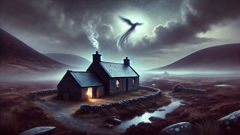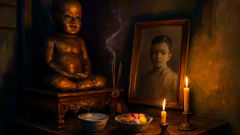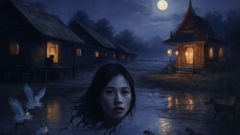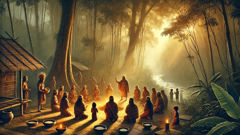Introduction
In the far-flung reaches of western Ireland, where the Atlantic wind sculpts stone and bog into strange, stoic beauty, lies Connemara—a land that seems to exist on the threshold of worlds. Long before the roads were tamed by cobblestone, before the abbeys rose from heath and heather, its people told stories of what lurked in the gloaming. The mountains rose dark against the sky, and mist rolled in from the sea to coil around thatched cottages and ancient cairns. At dusk, the air felt thick with old magic and memory. It was a time when the boundary between the living and the dead was as thin as morning fog, when tales carried by peat firelight warned of the Sluagh: the spirits of the restless dead, who gathered in invisible flocks and swept through the night sky like crows. They did not rest in grave or cairn, nor did they find peace in the churchyards. Instead, they drifted between the shadows, seeking entry into the homes of the dying, hungry for warmth, longing to steal away a soul for their company. For generations, the Sluagh had been both terror and explanation—a presence blamed for untimely deaths, mysterious chills, or inexplicable fear that crept in when the hearth’s glow faded. This is the story of Niamh, a healer’s daughter, who lived in the village of Clochán during a season when the Sluagh’s wings seemed darker, their hunger deeper. As the year waned and All Hallow’s Eve drew near, stories grew more urgent. It was said that to leave a window open at night was an invitation to the Sluagh. To whisper the name of the dead could summon them, and to show fear was to feed their longing. In this land, bravery was measured not just by blade or brawn, but by the willingness to face what could not be touched or reasoned with. Niamh had always believed in the old stories—believed in her mother’s murmured prayers, the herbs hung in doorways, the protective charms carved into lintels. But she never imagined she would be called to confront the Sluagh herself, or that she would come to understand the restless dead not as mere harbingers of dread, but as echoes of sorrow and longing that had been left untended for too long. In a season of withering light, when grief rode the wild wind, her courage would be tested in ways she could never have foreseen.
The Night Wind Carries Sorrow
It was an October like no other, the air tinged with a sharpness that cut straight through to the bone. Niamh pressed her hand to the window’s warped glass and felt the chill seep into her skin. Outside, darkness pressed against the cottage, thick and suffocating. Her mother’s coughing echoed in the small room, a reminder of how close death hovered now. But it wasn’t just illness stalking the village of Clochán—it was something older, something that scraped at the soul. Each night, as dusk slipped into midnight, the wind changed. It brought a keening sound, almost too faint for hearing, like distant voices entangled in the whistling moor grasses. The villagers whispered that the Sluagh were stirring again, restless and hungry. In the old tongue, her grandmother had called them the Host: a legion of souls denied rest, bound to each other by regret and bitterness. Once, they might have been neighbors, kin, or even friends—but now they were shadows in flight, slipping through cracks in stone and wood to steal a soul from the edge of life.
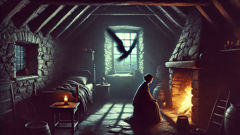
Niamh tried to sleep, but fear clung to her like a damp blanket. She remembered her mother’s warnings: never leave the west-facing window open, for that was the direction from which the Sluagh came. Never speak ill of the dead, for their spirits might take offense. She closed her eyes and prayed the old prayers, tracing a circle of salt around her mother’s bed. Yet even as she murmured protection, she wondered if such small acts could truly hold back the tide of sorrow that swept nightly over Clochán.
The first death came quietly—a fisherman named Eoin, found cold in his bed, a look of terror frozen on his face. It was said the Sluagh had carried him off, for a black feather lay on his windowsill, and the dogs would not go near his cottage for days. Then another followed: Mairead the midwife, her last breath drawn as the wind battered her door and something unseen scratched at her walls. The pattern was clear; they always struck those nearest death, as if scenting weakness. Fear burrowed into the village like a root, twisting through every conversation. Windows were shuttered tight. Children were forbidden to stray after sunset. Still, the darkness felt alive with wings and whispers.
By the third week, Niamh’s mother grew weaker. The village priest came to bless the house, scattering holy water and reciting psalms in Latin. But Niamh saw how his hands trembled. She tended her mother with poultices and patience, mixing herbs that her grandmother had sworn would ward off evil. But the nights only grew longer, the Sluagh’s presence heavier. One night, as she sat by the hearth, she caught sight of a shadow slipping past the window—too tall for a fox, too thin for a man. Her heart hammered as a chill breath swept through the room, snuffing out the candle flame. In that brief darkness, she heard them: voices layered upon each other, a dissonant choir of grief and longing. They whispered her mother’s name.
Niamh knew then that the stories were true. The Sluagh were real, and they were coming for her mother. But what could she do? Even the bravest warriors could not fight shadows. She remembered her grandmother’s tales—of those who had bargained with the Sluagh, or outwitted them by cunning and compassion. There was one story in particular, of a woman who had spoken directly to the Sluagh and learned their sorrow. That woman had survived, though changed. Niamh clung to that memory as she watched her mother’s breath falter, vowing to try what others had not dared.
The Bargain with Shadows
As her mother’s fever worsened and the villagers’ fear gave way to resignation, Niamh felt an inexorable pull toward the unknown. She spent her days gathering yarrow and rowan from the wind-bent hills, muttering charms as she worked. But no herb nor blessing seemed enough. On the night of Samhain, when it was believed that the veil between worlds thinned until even the dead could walk with the living, Niamh made her decision.

She waited until the fire burned low and her mother drifted into fitful sleep. Wrapping herself in a heavy shawl, she crept from the house, clutching a pouch of salt, a sprig of rowan, and her grandmother’s silver cross. The village lay silent under a bruised sky. Beyond the last cottage, bog and heather stretched out in shifting shadows. With each step, the world seemed to hold its breath. She reached the ancient standing stones—the place where her grandmother once said the Sluagh gathered before flight. There, she spoke aloud: “Sluagh of the western wind, hear me. My mother lies near death. Take me instead, if you must—but let her pass in peace.”
For a moment, only silence answered. Then the air grew colder, and shadows began to swirl around her. At first, they resembled birds, their wings beating without sound. But as Niamh watched, they coalesced into forms both human and inhuman—faces distorted by anguish, eyes glowing faintly in the gloom. She stood her ground, heart pounding. One figure stepped forward—tall, robed in tatters, its face half-hidden by shadow. It spoke in a voice layered with many others: “Why do you summon us, living one?”
Niamh swallowed fear and answered honestly. She begged for mercy—not just for her mother, but for all in Clochán. “Why do you hunger for our souls? What is it you seek?” she asked. The Sluagh’s leader replied, his voice heavy with sorrow. “We seek what was denied us—rest, remembrance, release from pain. Our stories have been forgotten; our graves uncared for. We are bound by loss and by anger. Each soul we claim joins our host, lost to memory.”
A bargain was struck. Niamh promised to honor their stories, to light candles for the forgotten dead, and to persuade her people to remember. In return, the Sluagh agreed to leave her mother—and any who honored the pact—in peace. But they warned her: “Break your word, and our hunger will return tenfold.” With that, they melted into the night, leaving only a single black feather at Niamh’s feet.
She returned home as dawn broke, every limb trembling. Her mother still lived—breathing easier, her fever broken. In gratitude and awe, Niamh began her work. She visited every grave in the old churchyard, clearing brambles and lighting votive flames. She urged her neighbors to speak kindly of those who had passed, to keep their memories alive through song and story. Some resisted, fearing the old ways; others joined her, desperate for any hope. For weeks, the nights grew quieter. The wind lost its keening edge. Yet Niamh knew peace would be fragile. The Sluagh’s hunger was ancient, and memory faded easily in hard times. Still, she held to her promise—her courage and compassion changing not only her fate but that of her village.
Conclusion
The years passed, and the tale of Niamh and the Sluagh became woven into the fabric of Clochán’s history. Her mother lived on, frail but free from dread. Children grew up hearing not only warnings about the Sluagh but also stories of hope—how remembrance and compassion could calm even the wildest spirits. At each Samhain, villagers gathered at the old stones with candles and offerings, their prayers carrying across bog and sky. The Sluagh’s presence never vanished completely; sometimes, on storm-laden nights, shadows would gather at the edge of vision, and a cold wind would rattle doors and hearts alike. But fear no longer ruled. Niamh’s courage had shifted something fundamental—a recognition that even the restless dead yearned for peace and connection. Her story spread beyond Clochán, whispered in market squares and by firesides from Galway to Donegal. In time, people learned to honor both the living and the lost, understanding that sorrow unspoken can linger and fester, but remembrance brings healing. And so, beneath the wild sky of Connemara, where mist and legend walk side by side, the boundary between worlds remained—haunted but hopeful, shaped forever by one woman’s promise in the face of shadow.

